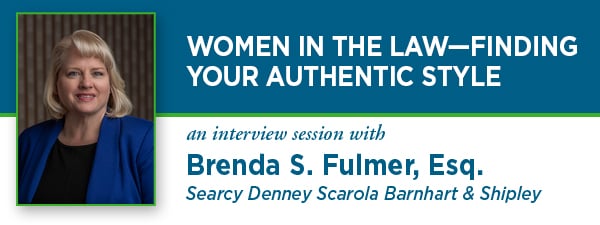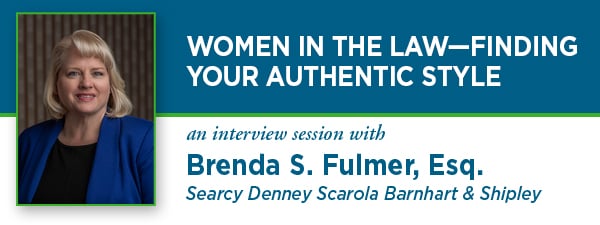Women in the Law—Finding Your Authentic Style
By: Elizabeth DiNardo, Esq. | Associate Counsel

 It’s not an exaggeration to say that most people have, at some point in their lives, felt pressure to conform to an expectation that society has arbitrarily levied upon them. This is especially true for women. As women, we are constantly bombarded with contradictory representations in the media and on television of how the perfect modern woman should look and act. When it comes to the idealized image of the female attorney, generally the message is the same—she is aggressive, she is loud and she is always impeccably dressed and coifed. This image seldom bears any real resemblance to the actual women who spend their days tirelessly fighting for their clients and trying to change the tides of gender inequality in the legal field. This month, we spoke with attorney Brenda S. Fulmer to get her perspective on the challenges facing the modern female attorney—her answers were refreshing and hopeful for the future.
It’s not an exaggeration to say that most people have, at some point in their lives, felt pressure to conform to an expectation that society has arbitrarily levied upon them. This is especially true for women. As women, we are constantly bombarded with contradictory representations in the media and on television of how the perfect modern woman should look and act. When it comes to the idealized image of the female attorney, generally the message is the same—she is aggressive, she is loud and she is always impeccably dressed and coifed. This image seldom bears any real resemblance to the actual women who spend their days tirelessly fighting for their clients and trying to change the tides of gender inequality in the legal field. This month, we spoke with attorney Brenda S. Fulmer to get her perspective on the challenges facing the modern female attorney—her answers were refreshing and hopeful for the future.
Brenda S. Fulmer has been a practicing member of the plaintiffs’ bar for the past 25 years, though her sights weren’t always set on the law. “I’m not the child of a lawyer nor was I a girl that argued so much that everyone thought she should become a lawyer.” Brenda goes on to explain that she was first exposed to the law during college when she took a part-time job at local law firm as a runner. That job soon evolved into Brenda conducting title searches, locating missing witnesses, preparing probate documents and eventually becoming a legal secretary. As graduation from undergrad loomed, Brenda realized that there was no reason why she couldn’t do as well, if not better, then her bosses as a lawyer. During her impressive career, Brenda has represented thousands of claims in the areas of pharmaceutical and medical device mass torts litigation. Through it all, Brenda has maintained her own authentic style as an attorney.
Early on in her career, Brenda realized that being the loudest voice in the room, or being the most argumentative person in a conversation, doesn’t make you a better or more persuasive attorney. To the contrary, Brenda insists that her natural introversion has often worked to her advantage. “Often while others around me are screaming over each other to be heard, I can take control of the situation and the floor by my silence and merely raising my hand to be heard” Brenda believes that whatever demeanor is the most natural to you is what will make you the most successful attorney. “Figure out what style is authentic to you and stick with it. Forget about how you think others expect you to act.” She insists that it is important to understand that there are a lot of different styles of leadership and influence, and that being the most aggressive person in a group is not necessarily the most effective one. “Once you understand your individual style, you can identify your strengths, harness this power, and use it to your advantage.”
Brenda believes that once you are able to feel confident in your own voice, you will be able to make the most effective changes. Change will not happen in any aspect of our society if we don’t stand up and make the change happen. As we’ve all witnessed in the past three years, women have become more outspoken about sexism and gender inequality, shining a light on issues that have long been ignored. However, the fight for true gender equality is hardly over especially in the legal field which has been traditionally a male-dominated arena. Brenda recalls the first years of her legal career in the early 1990s when older male attorneys would include younger male associates and law clerks on marketing meetings and golf outings, leaving the female lawyers behind to do the work. “Many choice assignments were made during these weekly golf outings and cocktails. Over time, this led to women not being seen as rainmakers or the client’s first choice for work, as they had not been given the same opportunities to develop client relationships and market themselves.”
The lingering inequality in the legal profession has fueled Brenda’s motivation to get involved in lobbying, participate in rule-making and helping to educate new lawyers in the hopes that future changes will serve the needs of both clients and the civil justice system. Brenda comments that she has seen a lot of progress towards equality in the legal field since she was first licensed and, thankfully, gone are the days when bar association meetings were held in private clubs that barred women from entering.
“We don’t have complete equality for women in the practice of law, although tremendous and promising progress has been made in the 25 years that I’ve been practicing. Women, however, are still expected to perform the ‘housework’ of the firm and are subject to implicit bias.” But just like finding your own authentic voice and leveraging it, Brenda believes that women can use gender bias to their advantage. “I believe that, sadly, female attorneys are often underestimated which can be a tremendous advantage in litigation. I also feel that many clients are more comfortable confiding in a female lawyer regarding their drug and medical device injuries, and this allows me to better understand each client’s damages and provide the best representation possible.” In the end, Brenda says that she feels that being a woman has been a benefit, rather than a disadvantage, when it comes to connecting with clients.
Beyond the challenges that women face at work, they must also deal with societal expectations. This notion that women can have it all—both at home and in the workplace—is antiquated and must be cast aside. “Women are under tremendous pressure to ‘have it all’ and are also judged so harshly when they fail or have to make hard decisions along the way. It’s so wrong.” Brenda is the mother of a 23-year-old daughter and she admits that at times she felt guilty about whether she was making the best choices for her career and family. She reveals that her daughter recently told her that having a successful working mother showed her that a woman and mother can fully love and support her family while also serving as a role model and fierce advocate for others, which was very helpful in alleviating that persistent guilt.
It is through the sacrifices that women like Brenda made as working mothers that the next generation now has a better understanding of what it truly means to be a working parent. It is only when men and women work together to share the domestic duties and child care responsibilities that we will be able to break through the stigma that society has placed on women who prioritize work—and men who want to take on the majority of the childcare responsibilities.
When asked what advice she would give to the next generation of female attorneys entering the industry, Brenda says, “Always remember why you chose to go to law school and routinely assess whether your law practice and life are in line with those values. The legal industry has become too much about money and winning, and it’s easy to forget about the tremendous power that we have to be forces to help our clients truly transform their lives as well as improving our communities.” Brenda also insists that mentorships are a crucial to the continued success of women in this field. “We all have an obligation to reach back and help those who are headed down the same paths, even if we did not have mentors to help us when we first started.” Brenda credits much of her success as an attorney to her own mentors to whom she refers to as “a tribe of brilliant, fearless, and mature (but certainly not old) women.”
“I would not have remained in the practice of law for 25 years but for the support of these women in my life and cannot stress enough how important it is for all female lawyers to develop these mentoring and support networks.”
Counsel Financial provides working capital credit lines exclusively for the plaintiffs' bar in all states except California, where credit lines are issued by California Attorney Lending.



